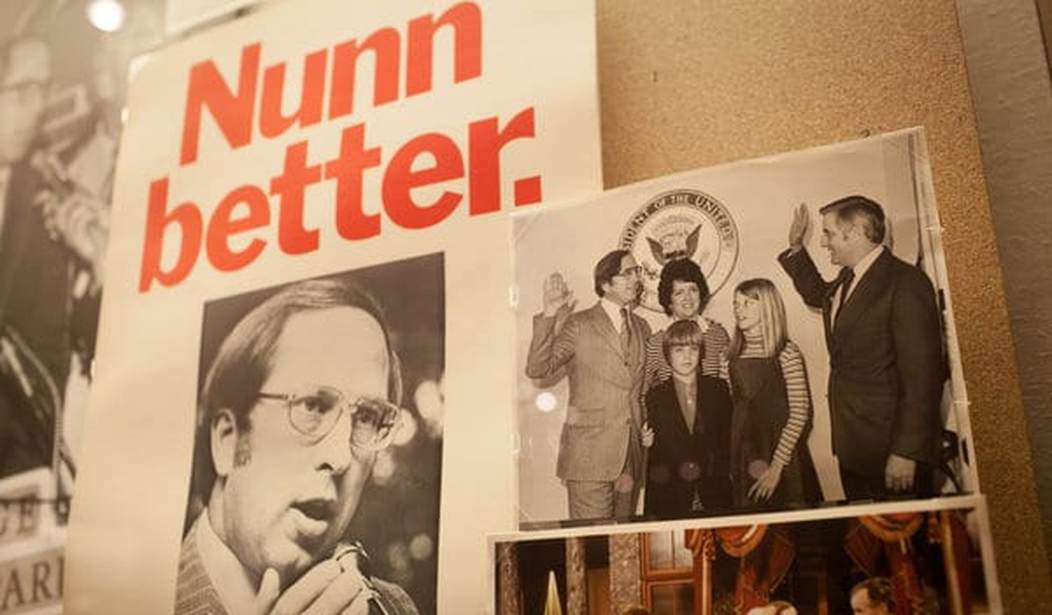WASHINGTON – Sally Rosser claims she has been involved in Democratic Party politics down in Georgia since “before there was dirt.” It hasn’t always been easy.
“Georgia has been a desert for us for quite a long time,” acknowledged Rosser, who now serves as vice chair of the Democratic Party of Georgia. “Dead is not adequate to explain where we’ve been.”
But Rosser now maintains Georgia Democrats, and others across the South, are in the midst of “an extraordinary time.” Where the party faithful once felt they had no shot against a growing Republican juggernaut, Rosser and other now maintain a perceptible thaw is underway.
Georgia, the Empire State of the South, a place where Republicans didn’t dare run for almost a century after the Civil War but embraced the GOP form of conservatism 30 or more years ago, is not about to abandon the party of Newt Gingrich anytime soon. But it appears much of the state is now willing to at least listen to Democrats.
Two Democrats stand a reasonable chance of capturing statewide office in Georgia. Michelle Nunn, the daughter of former Sen. Sam Nunn and the chief executive officer of the nonprofit organization Points of Light, holds a thin lead according to recent polling over any one of a group of Republicans seeking to replace retiring Sen. Saxby Chambliss.
Meanwhile, Jason Carter, a state senator and grandson of former Georgia governor and president Jimmy Carter, is nipping at the heels of incumbent Republican Gov. Nathan Deal, widely criticized because of his recent handling of an ice storm that virtually shut down the state.
“It was the most colossal failure of government ever,” Rosser said. “We are ready to elect a new governor of Georgia.”
Representatives attending the Democratic National Committee’s winter meeting in Washington this week insist Georgia isn’t the only southern state displaying the slightest of cracks in the Republican wall.
Florida, according to Alan Clendenin, vice chairman of the Sunshine State’s Democratic Party, is “about to go Scott free,” with polls showing Charlie Crist, the state’s former Republican governor turned Democrat, maintaining an edge over GOP Gov. Rick Scott. And a Democrat leads in a race to fill the unexpired congressional term of Rep. Bill Young, who died in office.
Even Mississippi, perhaps the reddest of the red states, is exhibiting modest Democratic Party gains, at least on the local level. Last July, Tupelo elected its first Democratic mayor in 28 years, giving Jason Shelton almost 60 percent of the vote.
“No one thought that would ever happen,’’ said R.T. Rybak, the former mayor of Minneapolis and a member of the Democratic National Committee.
In Virginia, Democrats recaptured the governorship last November along with two other statewide offices. Both of the Old Dominion’s senators are Democrats.
And then there is Kentucky, where President Obama received 38 percent of the vote in 2012. Polls show Secretary of State Alison Lundergan Grimes leading Senate Republican Leader Mitch McConnell, who has served 30 years in the upper chamber.
“The polls show President Obama is more popular in Kentucky than Mitch McConnell,” said Mo Elleithee, the DNC’s communication director. “You know what else is popular in Kentucky? Obamacare.”
DNC officials attribute the perceived gains to the rising influence of the Democratic Party’s “constituency groups” – African-Americans, single women and, most particularly, Latinos, a segment of the population that continues to grow in the South.
“This rainbow is the South,” said Gilda Cobb-Hunter, a committee member from South Carolina. “There are opportunities here.”
Clendenin said it is his sense that the Democratic Party is more popular than Republicans to “a growing diverse population.”
“If you look at the political landscape, a majority agrees with us,” he said. “You look at people who call themselves independents, they prefer us.”
Rep. Debbie Wasserman Schultz (D-Fla.), chair of the Democratic National Committee, said “it’s just unbelievable the appeal we have in the South.” While Democrats have the public’s back, she said, “the other side gives them the back of their hand.”
“We are forever attempting to expand the map and the way we’re going to do it is right through Georgia, Texas and Arizona, from red to purple to blue,” she said. “We have an opportunity to turn them blue. It’s not pie in the sky.”
Wasserman Schultz pointed to the DNC’s track record.
“A few years ago if we had said we were going to turn Virginia or Colorado blue we would have been laughed off the television screen,” she said.
Rep. John Lewis (D-Ga.), the civil rights pioneer, agreed that Democrats “have an opportunity in the heart of the Deep South.”
“We can take it back,” he said. “The people are ready. We need to get out there and lead. So be hopeful. Be optimistic. Never give up. Even in Texas, I tell you, the people are ready. When Texas goes blue they can kiss it goodbye on the other side. It’s going to happen.”
Despite the brave rhetoric, it appear Democrats are painting a picture that either appears too rosy or, at least, premature.
Three Deep South Democrats up for re-election this year, Sen. Kay Hagan of North Carolina, Sen Mary Landrieu of Louisiana, and, especially, Sen. Mark Pryor of Arkansas, appear to be treading water at best and could sink like rocks when November rolls around. It’s very possible that after the election the only Democrats left in the upper chamber from the old Confederacy will be Sen. Tim Kaine of Virginia and Sen. Bill Nelson of Florida.
Cobb-Hunter acknowledged troubled waters could still lie ahead, noting “we can do it if we stop feeling sorry for ourselves.”
“We need to quit acting so freaking defeated,” she said.
Regardless, Wasserman Schultz insists that the worm is about to turn.
“Several states have turned from red to purple,” she said. “Can you name one state that is turning from blue to purple? You can’t.”
Democrats also are looking hopefully at gains in the Midwest, another area that has proved to be fertile ground for Republicans in the recent past. Doug Brooks, a Democratic committeeman from Missouri, called it “the area where most change can take place.”
“People have much more of a positive feeling that’s genuine than I have sensed in a long time,” Brooks said.
Democrats are within four votes of capturing the state legislature in Iowa “and they’re going to do it,” Brooks said. Republican Gov. Sam Brownback, one of the nation’s most conservative leaders, is losing ground in the polls.
Elleithee predicts continued Democratic gains, noting that “inclusion, empowerment, these are our values as Democrats.”
“And I can’t want to rub their (Republicans) face in it,” he said.









Join the conversation as a VIP Member